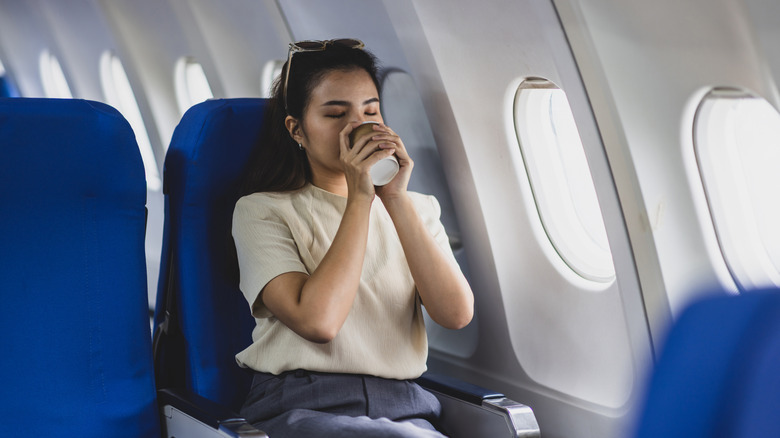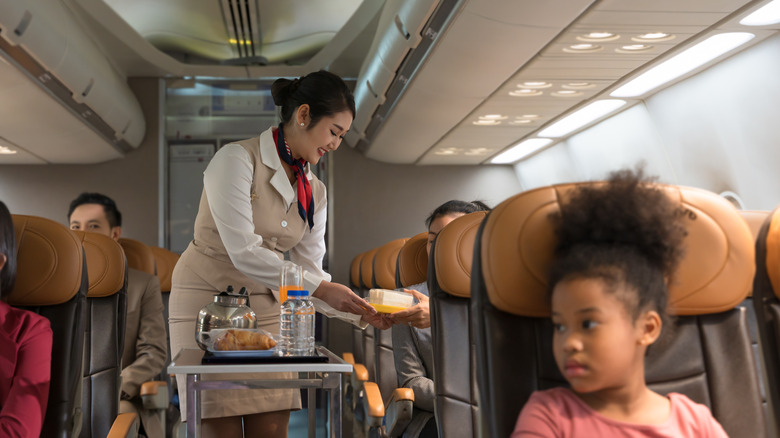Why You Might Want To Avoid Drinking Coffee While On An Airplane
To some travelers, ordering a coffee on a flight seems like the most natural thing, especially if you're catching an early-morning flight. But according to plane stewardess Kat Kamalani, you should think twice before ordering a common beverage like coffee on your flight. In a video she posted to TikTok under the handle @katkamalani, the flight attendant explains that passengers should never consume liquids unless they're pre-packaged. The reason? Airplane water tanks have such loose cleaning protocol that they're known to breed germs.
In fact, a 2019 study conducted by Hunter College NYC Food Policy Center and DietDetective.com found that the majority of U.S. domestic airlines — even if disinfecting their tanks the minimum one time per year required by the federal Aircraft Drinking Water Rule (ADWR) — were found to have either E.coli or coliform bacteria present in their tanks. There was a possibility they had been providing potentially contaminated water to their passengers. However, as reported by USA Today in 2023, this shouldn't actually raise alarms since all water being served from the tanks for coffee and tea is first boiled, thereby destroying the bacteria (bacteria perish at around 170 degrees Fahrenheit, 20 degrees below boiling). Regardless, you should exercise caution, particularly if flying out of a country where tap water is non-potable.
"As a flight attendant, we rarely, rarely drink the coffee or tea," Kamalani says, explaining that while the urns used to carry hot water can be removed easily and washed, the reserve tanks themselves are impossible to remove. Additionally, she emphasizes that those tanks are located right next to the toilets — the implication being that this is a region of the aircraft where harmful bacteria and viruses breed most. As insiders with knowledge of their planes' intimate workings, air stewards like Kamalani do not trust their health and safety to such uncertain waters.
Other food and drinks to avoid on a plane
Another reason to pass on coffee is to reduce excess bloating while flying. Cabin pressure increases 30,000 feet up in the air, exacerbating the effects of food and drinks that cause abdominal distention, like sodas, salty food, and coffee. In fact, many flight attendants recommend eating before you board your flight or bringing your own meals and snacks, since plane food is often salty and not particularly healthy. Again, the flight crew rarely eats the same meals and snacks they're providing you, not because they can't, but because they don't want to. Some recommend bringing filling, simple foods like fruit and vegetables, canned fish, nuts, and hard-boiled eggs instead.
Eating beforehand and avoiding onboard food and drinks is particularly useful if you're catching a red-eye or plan to sleep on the plane. According to the doctors at UCLA Health, timing your meals to the time zone you're flying to will help minimize jet lag and make adjusting your circadian rhythm easier. So when you fly through the night, having your last meal before departure will assist your body in adjusting to its new breakfast time if you wait to eat again until you arrive. And the same goes for coffee — if you typically start your day with caffeine, wait until your normal wake-up time after touching down. Only then should you give your body this powerful trigger to get the day started.
Overall, your best choice of beverage on any flight is bottled water. Dry cabin air causes passengers to dehydrate quicker than normal, and replacing lost water is key to avoiding discomfort. Try bringing electrolyte powder to add to bottled water, or, in a pinch, watered-down tomato juice or fruit juice is your next best bet.

